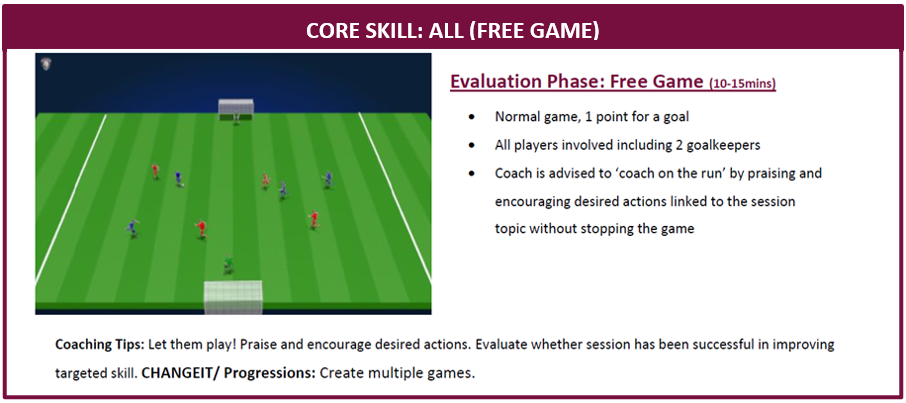ABOUT THE SKILL ACQUISITION PHASE
The foundation of the Skill Acquisition Phase is built upon:
- The coach focusing extensively on providing a solid foundation of technical skill.
- If the player does not gain this skill foundation during this phase it will be very difficult to make it up later; no amount of fitness or competitive spirit will ever compensate for deficiencies in functional game skills.
At this age the children are ready for a more structured approach to training.
In every session the focus is on one of the core skills, from the beginning until the end of the session (“theme based sessions”).
EXAMPLE SESSIONS
Based on each of the four core skills: 1v1, Striking the Ball, Running with the Ball and First Touch
CREATE YOUR OWN SESSION TOOL
While we have created the above example sessions for each of the four core skills, the most important part of coaching is that you design and deliver your session to cater for the needs and abilities of your players. As such, we have created this "Create Your Own Session" tool with a library of activities to choose from for each relevant session component. This library will be continually developed so keep an eye out for more activities as they get added in.
note: on laptop, click on arrows to view different activities.
on mobile device, swipe through on images to view different activities.
The Skill Acquisition Phase sessions consist of 5 components:
- FUNctional Activity
This is a FUN activity with lots of football specific movements in the first 5-10 minutes of the practical session with all players involved and the focus on developing fundamental movement actions at high speed. FUNctional Activities may include: games, circuits or juggling tasks that are FUN and linked to the core skill.
- Recognition Phase: Game
A game complying with the rules of the real game and free of any specific conditions for the first five minutes to encourage players to showcase freedom of expression; there should be two goals and goalkeepers protecting each goal to reflect the real game. After the first five minutes, the coach can introduce a scoring system as an incentive to bring about desired actions but does not restrict them from freedom of expression. For example, 1 point for a normal goal and 3 points can be awarded if the player scores after beating an opponent in a 1v1 duel.
- Intervention: Skill Breakdown
Opportunity to develop or refine technical competence with the core skills broken down in practice activities that closely resemble the conditions of the real game. Demonstrations by the coach or model player are encouraged to support learning functional technical skills.
- Evaluation Phase: Free Game
A game complying with the rules of the real game and free of any specific conditions or incentives to measure rate of learning and understanding; option to return to the original ‘recognition game’ or design another game free of any restrictions or incentives. It is also advisable to ‘wrap-up’ the session at the end, summarising the main points of the session.

- Home Skill
The coach is encouraged to provide players with a ‘challenge’ to practice at home, for example, perform three more juggles than a player’s personal best; these challenges need to betailored to each player’s needs and abilities.
CLICK HERE TO VIEW FOOTBALL AUSTRALIA SKILLS HUB
WHAT DOES THIS MEAN FOR TRAINING SESSIONS WITH CHILDREN THIS AGE?
The emphasis in the Skill Acquisition Phase is on Skill Development but this should not be separated from developing insight/game understanding at the same time. If this approach is applied properly, it will provide a seamless transition into the Game Training Phase.
During the Skill Acquisition Phase, 2-3 sessions of 60-75 minutes plus a game
is a safe weekly workload, with the following session planning guidelines:
- Welcome: 5 minutes
- FUNctional Activity: 5-10 minutes
- Game (Recognition Phase): 10-15 minutes
- Intervention (Skill Breakdown): 10-15 minutes
- Free Game (Evaluation Phase): 15-20 minutes
- Wrap up: 5 minutes
With 3 sessions per week our advice is to limit the duration of the sessions to
60 minutes and rest the players the day before as well as the day after the game. So, with a game on Saturday, we recommend a training session on Monday, Tuesday and Thursday.
THE FOUR CORE SKILLS
The Football Australia Skill Acquisition Phase program focuses on developing one of the four core skills and a main moment: attacking (BP) or defending (BPO).
- Striking the ball: this includes all forms of striking the ball such as short/long passing, shooting and crossing
- First Touch: controlling the ball with all allowed body parts
- 1v1: all moves, feints and accelerations to get past and away from an opponent
- Running with the ball: at speed (with a lot of space) or 'dribbling' (in tight areas), this includes techniques for protecting the ball and changing direction
Focusing on a core skill for a 2-week period will enable coaches to plan, prepare and deliver sessions that meet the needs and abilities of your players through on-going observation during training and matches. This will also provide adequate time for players to retain information on a focused core skill during training and games.
ACKNOWLEDGEMENT: this information has been derived from the Football Australia Skill Acquisition Manual produced by Kevin Grima and Eric Abrams.
IMPORTANT
Whilst we have created these resources for your use, what you deliver on the pitch needs to cater for the needs and abilities of your players.
To assist you in this, we highly recommend that you undertake a MFA Coach Development Opportunity. Coaches at all levels play a crucial role in ensuring that football is an enjoyable experience for everyone, as well as laying the foundation for the development of better players. As such, our Coach Development opportunities have been designed to support you in whatever role you have whether it be in junior, youth or senior football.
Click HERE for more information on our MFA Coach Development Opportunities and to find which course will be right for you, your coaching journey and the players you are working with.

